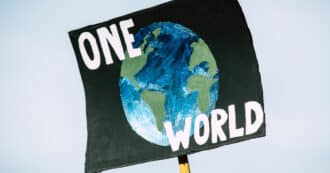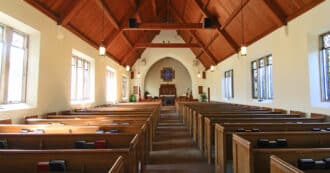The Rev. Dr. Leah D. Schade; leahschade@gmail.com
Here are ideas for reading and preaching Genesis 11:1-9 and Acts 2:1-21 through a “green” lens on Pentecost Sunday. This is part of the EcoPreacher 1-2-3 series to equip pastors and congregations for engaging the Bible and God’s Creation.
Make Babel great again? Hardly. There’s a reason why that monocultural empire failed. It’s because God desires diversity for both the human and Earth community!
Eco-Exegesis
Eco-exegesis is a method of interpreting the biblical text through a green lens using the principles of ecological theology. For this passage, we turn to the Eco Bible, a Jewish ecological commentary on the Hebrew texts.
Genesis 11:9 — “The Lord confused the language of all the earth; and from there the Lord scattered them abroad over the face of all the earth.”
According to Eco Bible: An Ecological Commentary, Evan Eisenberg writes that “the Tower of Babel, in the Mesopotamian kingdom of Sumeria, represents the arrogance of the world’s early farmers who thought their own work cultivated their prosperity,” (26). Their desire for dominance was exercised through a single language, mastery of technology (artificial building materials, v. 3), and an imposition of cultic towers to rival the mountains of God.
Dr. Jeremy Benstein sees a correlation with today’s “recent trends of corporate globalization, pointing to a world monoculture – unity through uniformity” (27). This results in “alienation from the earth, each other, and the divine” and threatens the “delicate fabric of diversity, of cultures and their habitats” (ibid). When God confuses the language of empire and scatters the people “over the face of all the earth,” this serves as a warning to humankind. When we worship our own technology and hegemony, the consequences of violence, pollution, and environmental degradation are soon to follow.
Acts 1:11 – “(I)n our own languages we hear them speaking about God’s deeds of power.”
In contrast to those who built the Tower of Babel, the story of Pentecost in Acts 2:1-21 lifts up the divine purpose of diversity. God does not make all those gathered around the disciples speak the same language. Rather, each disciple is equipped to speak the gospel in a different language. Thus, the sustainable diversity initiated at Babel is carried through the founding of the first Christian community.
From this we can conclude that God loves diversity! God created a stunning diversity of habitats, plant life, animals, birds, and fish. This diversity is intended to be mirrored in human society through the multiplicity of languages, foods, skin colors, cultures, and religions. The more diverse we are, the more we are able to build resilience as a human community, just as ecosystems maintain resilience with a variety of plant and animal species.
1. Eco-Idea
The Eco-Idea is one succinct statement that tells us who God is and/or what God does in relation to Creation and how we should respond as people of faith. The Eco-Idea for this sermon is:
Just as God created diversity in the origin stories of Genesis, God desires diversity for the human and Earth community today. So, people of faith should celebrate and encourage diversity within their communities and local ecosystems.
2. Eco-Questions
Eco-Questions are what we can ask to help a congregation draw out the implications of the Eco-Exegesis and Eco-Idea.
- How diverse are the foods you eat? Do you mostly consume the homogenous ingredients of the fast food industry – meat, cheese, wheat, corn, oil and sugar? Or do you vary your diet with a plethora of plant-based foods? Could your church host a vegetarian cook-off to allow people to sample (and show off) their favorite recipes?
- How diverse are the neighbors with whom your church interacts? Do you have space to host a cultural food festival? Or an immigrant congregation that speaks a language other than English? Could your congregation support a refugee family seeking a new life in your community?
3. Eco-Actions
Eco-Actions are ways that a congregation might respond to the Eco-Idea and Eco-Questions. One of these possibilities may have salience for your preaching context.
- Diversify your diet. Try a new fruit or vegetable, especially varieties that are locally grown and from organic farms. Or plant heirloom seeds of your favorite vegetables that will provide different tastes and textures for your pallet to enjoy.
- Diversify your cultural competence through community gardening. This blog post for Baylor University by Zane Peng describes the efforts of a garden planning committee to nurture a culture of inclusion and diversity: https://blogs.baylor.edu/thi/2021/02/04/south-texas-juvenile-diabetes-associations-garden-finding-success-through-inclusion-and-diversity/.
- Protect diversity within the animal kingdom. Organize a day for members of your congregation to call your member(s) of Congress (202-224-3121) and encourage them to defend the Endangered Species Act.
1Eco Bible: Volume One: An Ecological Commentary on Genesis and Exodus, citing Torah of the Earth, vol. 1, Arthur Waskow, ed., Evan Eisenberg, “The Mountain & the Tower,” 30-33.
2Jeremy Benstein, The Way Into Judaism and the Environment (Vermont: Jewish Lights Publishing, 2008), 64-66.
* Featured image source





